Essays
Essays

Planetary Realism – Art Against Apocalypse
Traditions of realism are brought together with the decolonial and ecological concept of "planetarity" to understand a new realism in contemporary art.
The devastation left in the wake of modernity and globalization is revealing a fragile and unfamiliar planet, and humanity has awakened to a new real. If the old "realist" tools of objectivism have contributed to capitalist society's divorce from the natural world, how are artists finding new ways to make us really see—and feel—the planet?
Surveying a body of planet-facing art, communal practices, and activism, Josephine Berry investigates art's power to break with capitalist realism and decarbonize the imagination. With chapters on feeling as world-making, the rupture of petroleum landscapes, artists' urban exodus, and migration as survival, Planetary Realism delves deeply into art's necessary reimagining of life on Earth.
"Planetary Realism is a deeply necessary book to add to our toolkit of struggle against a corporate world intent on destroying our planet for nothing but profit. Berry's book is a wake up call to artists and all those whose imaginations have not been destroyed by the consensensual silence surrounding the life or death issue of climate catastrophe. She dismantles the concept of art's autonomy to describe how artists all over the world are becoming artworkers for Planet Earth." — Peter Kennard, London-based artist and activist, and Emeritus Professor of Political Art at the Royal College of Art
"Through this superlative and vigorously argued version of a realism for today—meticulously attuned to planetary predicaments and the art and culture that inhabits them—Berry gives us means to map ways of being more hospitable, disobedient, migratory, alive, in the present." — Matthew Fuller, co-author of Bleak Joys: Aesthetics of Ecology and Impossibility, and Investigative Aesthetics: Conflicts and Commons in the Politics of Truth
Josephine Berry is an art theorist, writer and editor. She supervises thesis only and practice based PhDs in the School of Arts and Humanities, Royal College of Art, London, and teaches in Media Communication and Cultural Studies at Goldsmiths, University of London. She is a member of Mute magazine's editorial collective Mute and is a peer reviewer for the journal Theory, Culture & Society.
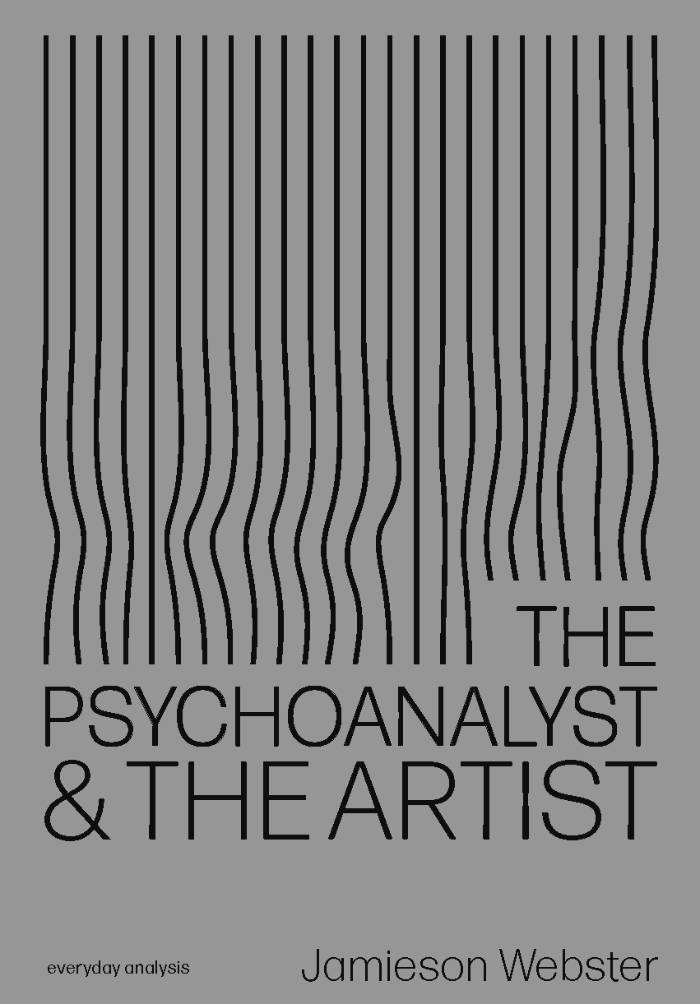
The Psychoanalyst And The Artist
In these essays, New York psychoanalyst and author Jamieson Webster considers the relationship between the studio and the psychoanalyst's couch. From the scopophilic instinct of the viewer and the artist's anticipation of it to the pursuit of perfection and it's connection to the girl-child's curiosity about her mother's body, she asks us to think about art and analysis as connected practices. Focusing on Carroll Dunham and Louise Bourgeois, she argues for an embrace of our wildest symptoms in theory and in art.

Bodies To Wear
This pamphlet takes as a model Jacques Lacan’s 1964 seminar in which he presented four fundamental concepts of psychoanalysis, the unconscious, repetition, the transference, and the drive.[i] In a similar manner, it reflects on some key concepts that underpin the author's clinical work as a psychoanalyst with trans-identified analysands. It argues for the re-discovery of four terms that expand Lacan’s central insights and apply to the question of trans today.
The first one is that of realness and it develops Lacan’s notion of the Real as not identical with reality; realness is often used by trans persons to describe the authenticity of their gender performance for it is a supreme truth beyond any verification.
The second concept is the concept of plasticity as developed by Catherine Malabou and applied to Schreber’s case discussed by Freud and Lacan. Plasticity leads to a conversation about beauty and its function in trans discourse.
The third concept is that of the nothing articulated with a certain type of laughter, a nothing introduced by Democritus and discussed by Barbara Cassin, Alain Badiou and Madlen Dolar. Lacan famously identified the “nothing” as one of the objects of psychoanalysis. I push the analysis to the point where one can understand a wish to “not being” (as found in suicide) as leading to the goal of “being again.” The meden was deployed by Barbara Cassin in her book Lacan the Sophist, and in discussion with Alain Badiou.
Finally, the last concept is that of the clinamen or turbulence in atomic philosophy (Lucretius) and in contemporary discourse; this turbulence throws new light on the role of accidents, and how accidents can turn into destiny (tuché). The classical concepts of the clinamen and turbulence have been explored systematically by Michel Serres. This turbulence echoes with Lacan’s notion of the sinthome as a symptom that does not need to be cured but leads to a re-creation of oneself that makes life livable.
The pamphlet offers a new twist to philosophical references the author discussed in Transgender Psychoanalysis (2017). Taken together, these four clusters of concepts provide a foundation for Gherovici's thinking about psychoanalysis. She rethinks Lacan's notions of the Real, the nothing, the endless transformations of the body that pertain to plasticity, the clinamen, the death drive - all of which are shown to be key to her understanding of the trans experience as revealed in her clinical practice.
[i] Jacques Lacan, The Seminar of Jacques Lacan, Book 11: The Four Fundamental Concepts of Psychoanalysis, New York: W. W. Norton, 1998.

Feminist Fatwas
Feminist Fatwas traces how Muslim feminists are resisting misogynistic interpretations of the Quran (like the verse male clerics have used to condone wife-beating).
For centuries, the translators and interpreters of the Holy Quran have been men. This is changing now as more and more Muslim feminists cast their eye on the patriarchal contexts of these interpretations. Feminist Fatwas tells the story of Verse 34 in Chapter 4 which has been interpreted by male clerics as condoning a husband beating his wife. This essay traces the groundbreaking work of knocking down this misogynist Quranic interpretations. The story of how Muslim feminists are doing this work is a chronicle of the slow and quiet feminist revolution taking place within Islam as women take on significant and powerful roles.
Rafia Zakaria is a Pakistani-American attorney, feminist, journalist, and author. She has written for The Nation, Guardian Books, The New Republic, The Baffler, Boston Review, and Al Jazeera. In 2021, she published Against White Feminism, in which she critiques the emphasis that conventional feminist thought places on the experiences of white women while excluding women of color
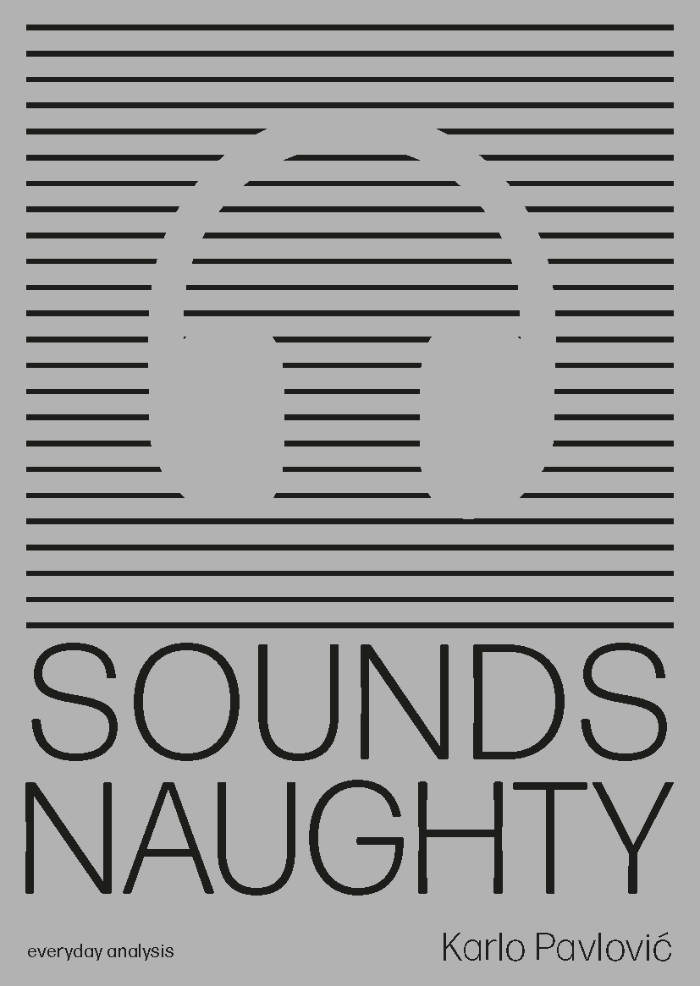
Sounds Naughty
In this psychoanalytic pamphlet, Croatian philosopher Karlo Pavlović analyses the perversions of the day. Considering the topic of ASMR, a key example of what he calls the generalised deployment of subtle pornography, of depictions of sexuality "in gloves", he argues that society today should be understood through the blue balls phenomenon. This concept, developed playfully by Pavlović, explains that we are all perverts taking the logic of the drive to its extreme; if the whole point of the drive is not to attain its object, but rather, to circle around it, the perverse subject (as the subject of the present times) has, in fact, no problems with this whatsoever.
Karlo Pavlović is completing his PhD in Philosophy at The University of Ljubljana, supervised by Alenka Zupančič.

Parapraxis 06: Resistance
In 1911, Sigmund Freud addressed his followers gathered at Nuremberg, where he restated the import of his practice: “the task of psychoanalysis lies not at all in the discovering of complexes, but in the dissolving of resistances.” A formal antipode to political resistance, psychoanalytic resistance dams up desire and obstructs traumatic knowledge. It is conservative, allergic to change, and aims for the kind of frictionless normativity against which the unconscious drives rail. Meanwhile, we associate political resistance with change itself, with a blockade that pushes for revolution—rather than a blockage that censors its very possibility. If we read Freud as urging his followers to help their patients move through their resistance, psychoanalysis is a project on the side of material and political reality by bringing patients out of isolation and into social struggles. However, psychoanalysis is often glossed in reverse: as a project of isolated relief for the stubborn individual.
Should psychoanalysis only succeed at rendering patients compliant in their cure? Is psychoanalysis a tool for nullifying political resistance? If so, Freud’s edict for the aim of psychoanalysis is now but an epitaph. It would be easy, then, to give up the ghost, to let psychoanalysis go. But why should psychoanalysis retreat from collective symptoms back into the consulting room for individual treatment—away from strikes, riots, and uprisings, and toward complacency and normativity, if not quite literally marriage and babies? Why should the clinic not dare to be in and of the world?
Feeling restless. Hunger tactics. Laughing in the face of fascism. Breaking through. Diagnosing revolution. Madness in the Maghreb. Essays by Fady Joudah, Jamieson Webster, Dylan Saba, Yasmin El-Rifae, Ussama Makdisi, Mary Turfah, Hannah Proctor, and more.
In Memory of Joshua Clover (1962-2025).
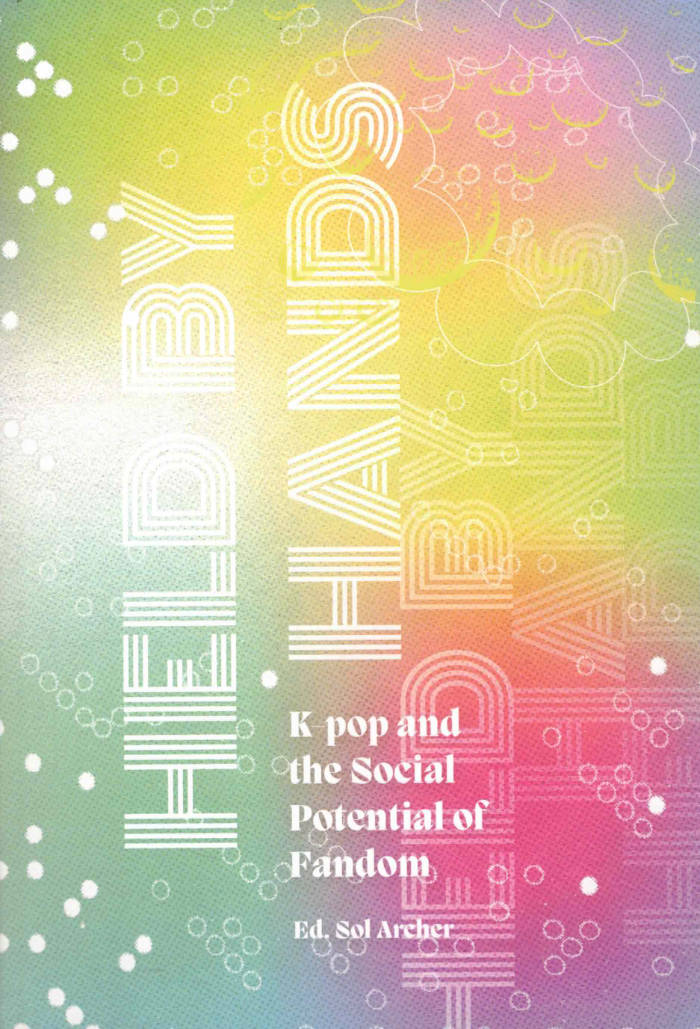
Held by Hands: K-pop and the Social Potencial of Fandom
This book brings together personal and theoretical reflections written by members of the Brazilian K-pop community on the constructive potential of fandom in contemporary society. The texts spans experiences of occupying public space through collective dance practice, identity formation and community support, cultural appropriation in K-pop, the e ects of soft power, and considerations of the phenomenon of fandom
In the fandom universe passive consumption of culture is replaced by active participation in its co-creation. Fan-fiction is one among many examples of this. Autonomous territories, with con gurations and laws unto themselves, are built by fans experiencing culture in collectivised ways. The sense of belonging and formation of identities enabled by exchanges and diverse practices make the K-pop fandom a space with the potential for radical social transformation and collective agency, resisting contradictions inherent to contemporary social norms. This book is a collective body dancing utopia.
With contributions by Aline Barbosa, EVE, Julia Guerreiro, Kananda Simonetti, Kelly Nobre, Lohaynne Beringui, Lucas Victor Aureliano, Marcelle Belfort, Millah C. S. Gomes, Natália Amorim, Paula Castro, Paulina Yeal Cho e/and Sabrina Diniz.
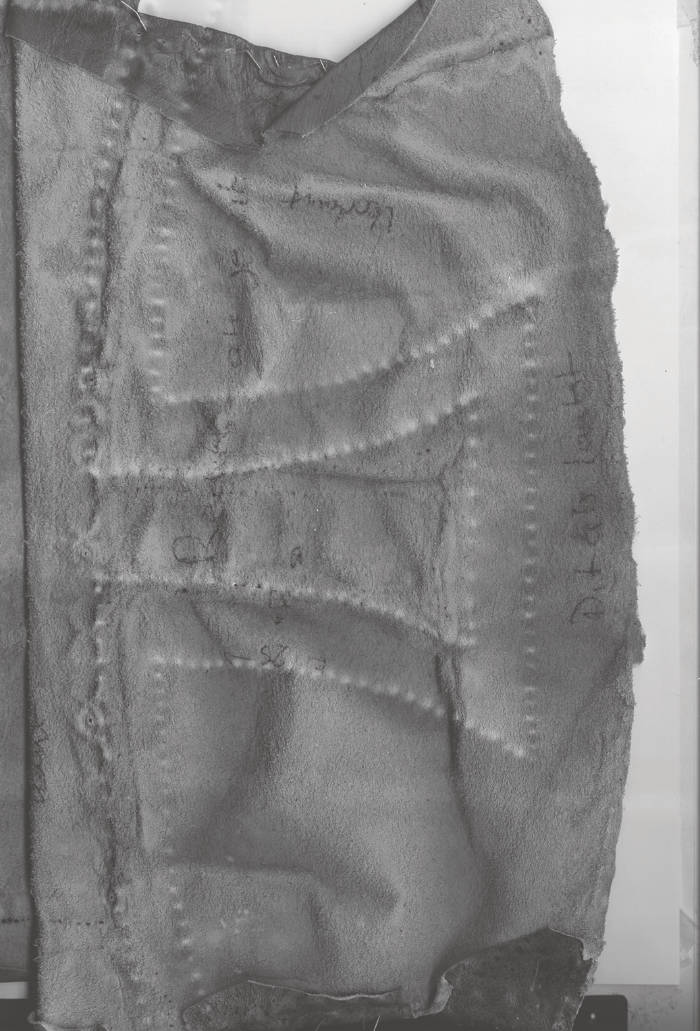
Teenage Lightning: Cinematic Apparatus On Humanly Perception
The book explores how we experience perceptual dissociation and deep immersion when engaging with screen media. Drawing from perspectives such as media criticism, psychological states, and the evolution of visual technology in cinema, it examines how our senses respond to screens. A central theme is the reconsideration of animism—the belief that objects or images possess life—as a fundamental, primitive form of cinema. The work also reflects on the relationship between light and the screen, integrating my own artistic practice in film, light, and interactive media.
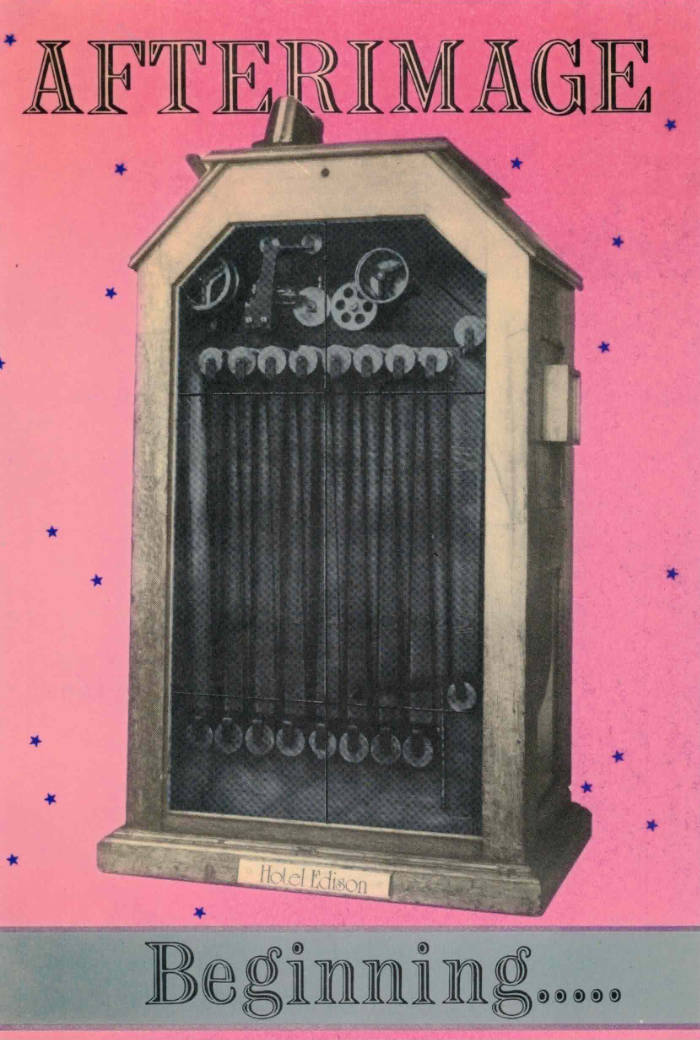
Afterimage Nos. 8/9, Beginning … and Beginning Again
The independent British film journal Afterimage published thirteen issues between 1970 and 1987. International in scope, it surveyed the many forms of radical cinema during an extraordinary period of film history. Having emerged in the wake of post-1968 cultural and political change, Afterimage charted contemporary developments with special issues on themes such as the avant-garde, Latin American cinema and visionary animation, and also looked back at early film pioneers. It published many of the leading critics of the period and vitally provided a forum for filmmakers’ writings and manifestos.
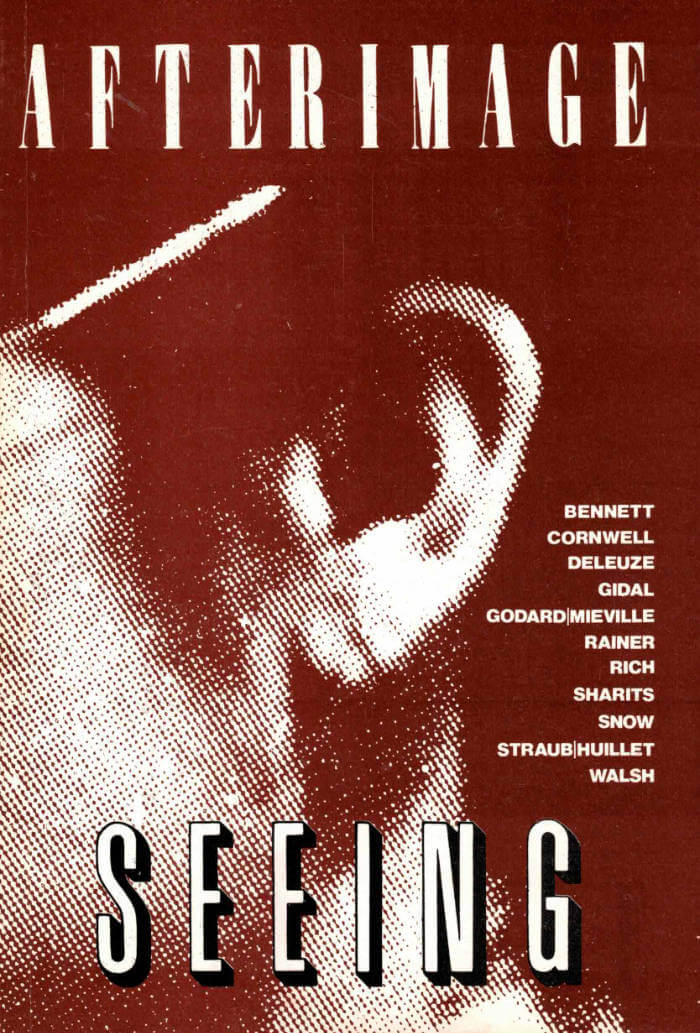
Afterimage No. 7, Seeing: Hearing
The independent British film journal Afterimage published thirteen issues between 1970 and 1987. International in scope, it surveyed the many forms of radical cinema during an extraordinary period of film history. Having emerged in the wake of post-1968 cultural and political change, Afterimage charted contemporary developments with special issues on themes such as the avant-garde, Latin American cinema and visionary animation, and also looked back at early film pioneers. It published many of the leading critics of the period and vitally provided a forum for filmmakers’ writings and manifestos.
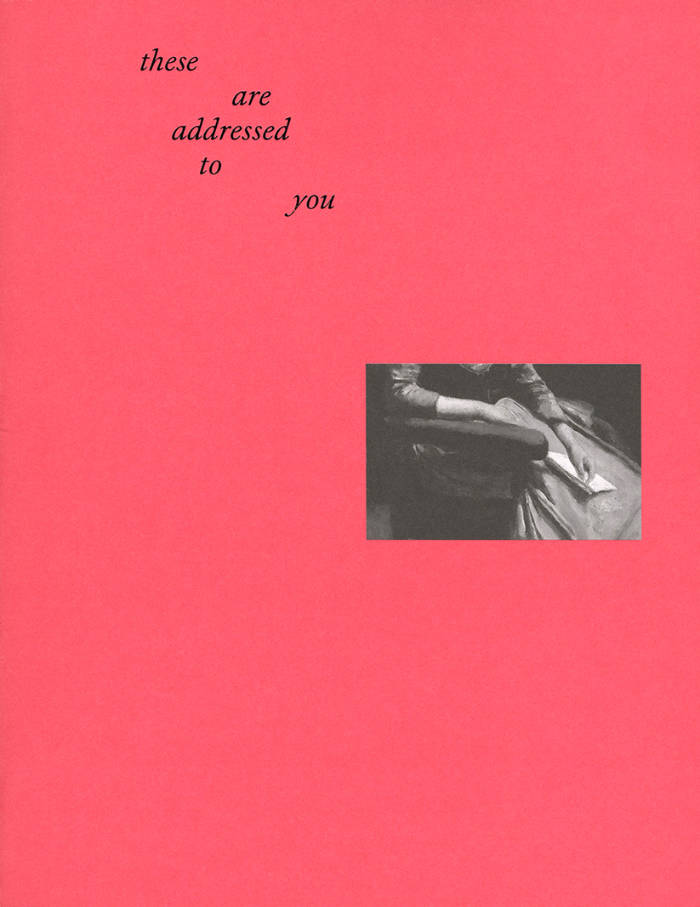
These are addressed to you
A collection of twenty-six abécédaire missives by Sharon Kivland, written and sent daily to the editors (MS & AWL) between Friday 7 February and Tuesday 4 March 2025. Interjected with melancholic ‘Mes horizons’ postcard erasures and an insert of abcedminded replies by Matthew Stuart titled ‘A Letter Always Suggests a Word’, this publication is both a standalone edition and precursor to BFTK#8, which focuses on letters (alphabets) and letters (correspondence).
‘These are Addressed to You’ addresses what it means to be addressed and to address, to write with love and scorn, to seal with a kiss and conceal impressions and hair within a letter’s folds, to inscribe with ink and thread, to speak with and to those we admire. Drawing on / from Freud and Lacan, Joyce and Carringdon, Camille Corot and many more, these letters are about writing and reading, about language falling and bumping you on the head.
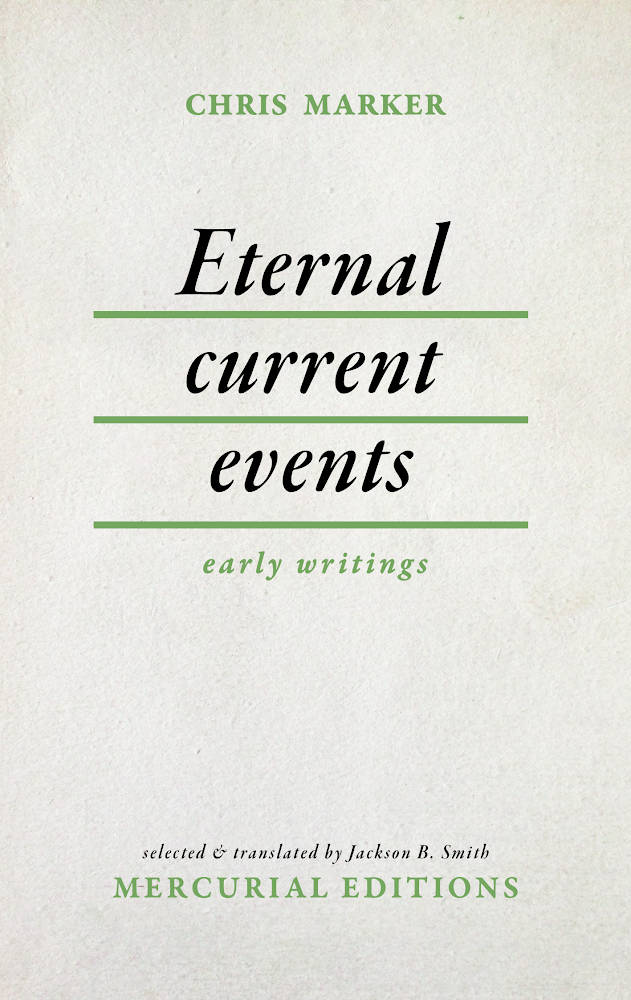
Eternal Current Events: Early Writings
Chris Marker, Jackson B. Smith
Before making his first films in the 1950s, Chris Marker was a regular contributor to the Paris-based magazine Esprit from 1946 to 1952. Unbound by genre or form, Marker's pieces range from short stories, essays, poems, and reviews to fabricated reportage and invented news affairs, all gemmed with the hallmarks of his style: a blurring of reality and imagination, a wry sense of humor, a sustained political engagement, and, of course, a limitless curiosity for animal life.
Eternal current events marks the first time these exemplary works are available in English, published in an adapted facsimile of the original periodical. In these short selections, what one encounters is less a past life before his turn toward cinema than a preamble to his celebrated body of work. Moving images did not replace Marker’s production as a writer but were incorporated into it. Before the “imaginary films” there were “imaginary current events”; before the travels through time in La Jetée there was a bulletin rethinking the psychogeography of the around-the-world trip; and before the musings on a Japanese temple consecrated to cats in Sans Soleil, there was a summary report on the theological implications of the 1952 Parisian Cat Fair. Marker did not just begin his career as a writer, he remained one throughout his life.
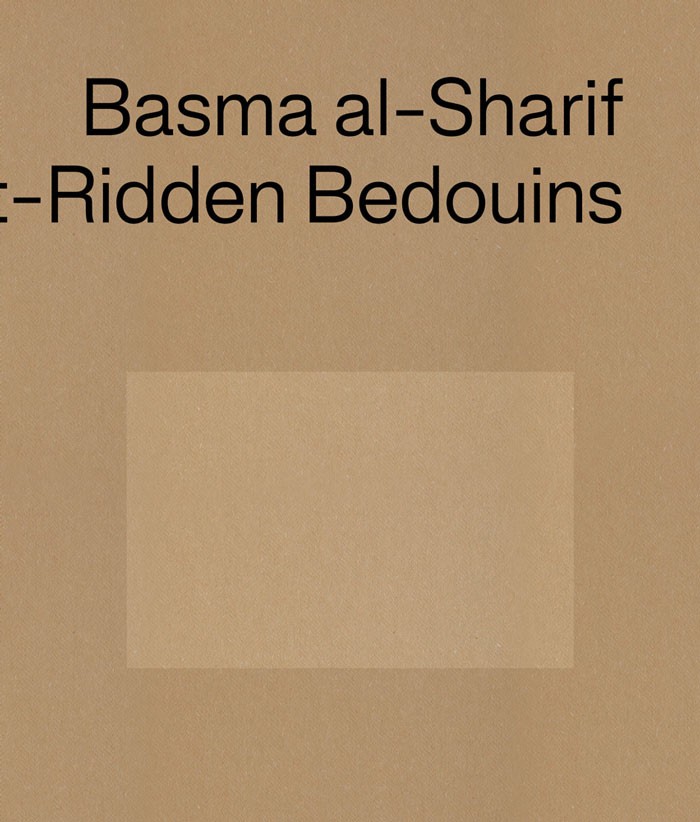
Semi-Nomadic Debt-Ridden Bedouins
Semi-Nomadic Debt-Ridden Bedouins offers an in-depth look at nearly two decades of artistic output by the Palestinian artist and filmmaker Basma al-Sharif. Retracing her practice from recent works back to her earliest experiments, the book provides an original overview of how her visual language and conceptual concerns have evolved over time.
Basma al-Sharif's films and installations navigate the unstable terrains of displacement, colonialism, and representation—often shaped by the ongoing reality of the occupation of Palestine. Through a rich selection of images and curatorial essays, the monograph highlights the layered political and cinematic frameworks within which her works are embedded.
Also included are two newly commissioned literary contributions: a fictional piece by Karim Kattan that resonates with the themes of place and estrangement, and a conversation between al-Sharif and the artist Diego Marcon, in which they reflect on shared affinities, artistic processes, and their long-standing dialogue. Blurring the personal and the political, the real and the imagined, Semi-Nomadic Debt-Ridden Bedouins captures the complexity and urgency of al-Sharif's artistic journey.
Texts by Basma al-Sharif, Karim Kattan, Diego Marcon, et al.
Basma al-Sharif (born 1983 in Koweit) is a Palestinian artist working in cinema and installation. She developed her practice nomadically between the Middle East, Europe, and North America and is currently based in Berlin. Her practice looks at cyclical political conflicts and confronts the legacy of colonialism through satirical, immersive, and lyrical works.
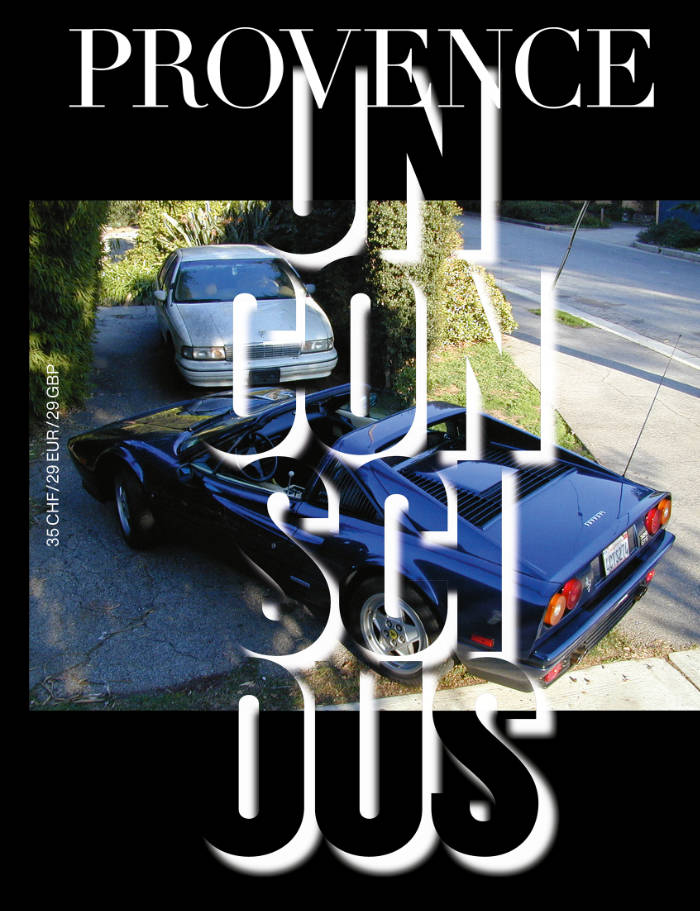
PROVENCE UNCONSCIOUS
PROVENCE UNCONSCIOUS deep dives into the cosmological pool that shapes the collective unconscious and takes a look at the relevance of Jung's ideas in relation to contemporary art and fashion.
PROVENCE UNCONSCIOUS draws inspiration from the Zurich-based office's proximity to the C.G. Jung Institute in Küsnacht—recently and notably visited by Pamela Anderson, who also appears in the publication. PROVENCE UNCONSCIOUS focuses on the work of three US-American artists—Mike Kelley, Matt Mullican, and Jason Rhoades—whose practices orbit around the themes of psychoanalysis and the unconscious. The issue also features collaged analog photographs of Laura Langer's spiral paintings, and a manuscript-style dream archive: over 30 hand-written or drawn submissions by artists, curators, jungians, and writers. Additional sections include, among many other things, jewelry by Bernhard Schobinger, photographs by Calla Henkel and Max Pitegoff, and a curatorial exploration of Emma Jung—analyst and wife of C.G. Jung—shedding light on the often-overlooked feminine legacy within Jungian thought.
PROVENCE UNCONSCIOUS didn't include any cooking recipes. And no, PROVENCE is not a magazine—but if it were, it would probably be the most radical one among its contemporary art peers.
Edited by Tobias Kaspar, Paolo Baggi, Samuel Haitz, Nina Hollensteiner, Claire Shiying Li, Veronika Dorosheva, Tatjana Hub.
Contributions by Pamela Anderson, Nina Hollensteiner & Claire Shiying Li, Forrest Bess, Matt Mullican, Mike Kelley, Valerie Smith, Delcy Morelos, Jimmy Raskin, Petra von bechtolsheim, Elizabeth leuenberger, Laura Langer, Bernhard Schobinger, Sophie Gogl, Susan Hiller, Calla & Max Pitegoff, Emma Jung, Rebecca Ackroyd, Korakrit Arunanondchai, Claire Shiying Li, Séverine Heizmann, Olga Fröbe-Kapteyn, Raphael Gygax, Stefano Carpani, Sabrina Tarasoff lITeRaTURe, Leda Bourgogne, Olamiju Fajemisin, Veronika Dorosheva, Lera Polivanova, Edgars Gluhovs.
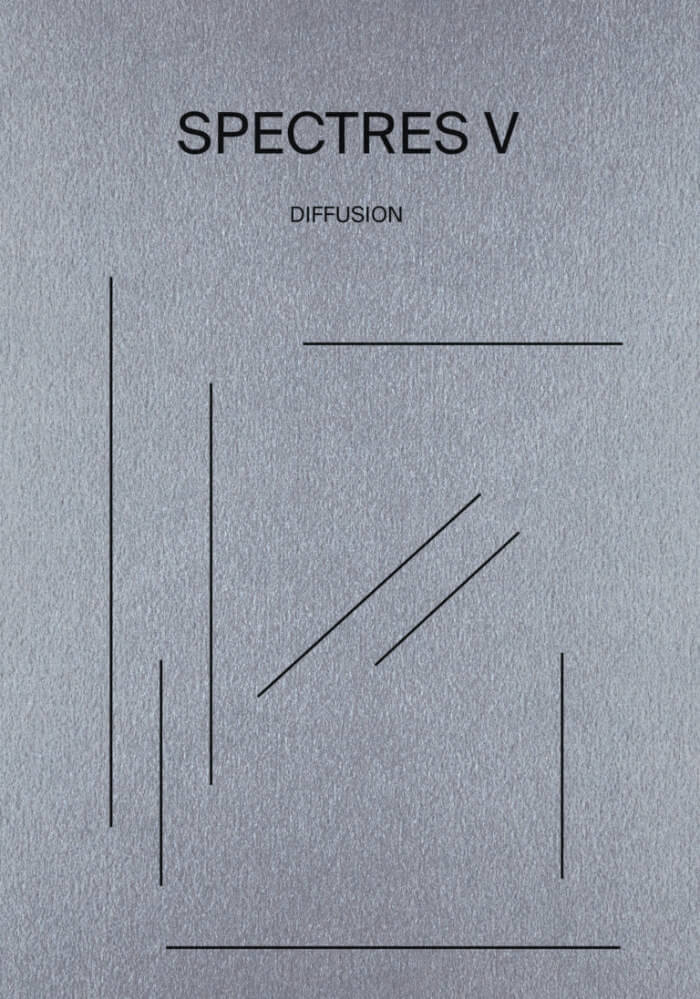
Spectres #05 – Diffusion
François J. Bonnet, Bartolomé Sanson
The fifth issue of the annual publication dedicated to sound and music experimentation, co-published by Shelter Press and Ina GRM – Groupe de Recherches Musicales, on the theme of diffusion and dissemination.
In a 1955 pamphlet entitled Seven Years of Musique Concrète, Jacques Poullin wrote:
"[...] sound projection in a concert hall is a logical extension of the concerns of the Groupe de Recherches de Musique Concrète and requires its technicians to properly study multiple aspects of the problems of sonorisation that are often neglected and to date have been almost exclusively the preserve of 'public address' technicians".
From the very beginning, fixed media electroacoustic music in its various guises faced a significant challenge: that of how it could be shared with the public. Even before it was distributed in the form of records, musique concrète, having first been transmitted on radio, soon turned to the concert stage. From the time of its birth, a twofold question was posed: What strategy of diffusion could be used for this music which involves no live performers? But also, how could it make use of existing systems of sound amplification without losing its singular nature, making sure to preserve its own particularities? Identified very early on, these questions have lost none of their pertinence some seventy years later.
Under pressure from the cultural industries and faced with a largely commercially-driven standardisation of formats, it is important today to reaffirm both the singular nature of experimental electroacoustic practices, and the possibilities these practices open up beyond standards and rules.
This calls for an exploration of the vast domain of sound creation in which, here and there, ideas, concepts, and sometimes new works appear that fully embrace the question of the deployment of sound, its dissemination and its expansion. An exploration focussed on the listening experience—a fundamentally musical experience—but adopting a critical approach which may sometimes call into question traditional ways of sharing and listening to sound, the status of listener and creator, and which may even challenge the acoustic integrity of venues and the legitimacy of diffusion systems.
Such are the questions to be addressed here. Sketching out the contours of what is quite obviously a huge subject, this volume, drawing upon a wide variety of points of view, experiences, and ideas, hints at an entire critical apparatus that remains to be developed and consolidated, but is crucial given the primordial importance of the theme of dissemination. For dissemination is the transitional stage par excellence, the uncertain stage that sits between creation and reception while at the same time determining both. It is a critical stage, yet one that is often neglected or, as Poullin says, left to a technical intermediary who may impose conditions entirely exogenous to questions of music and listening.
For these reasons, it seems more necessary than ever to return to the experience of sounds, to once again listen attentively to their trajectories, their diffraction in space, their emergence and their disappearance. To get to grips with the mysteries of their deployment so as to reaffirm that this deployment is essential to them.
Edited by François J. Bonnet and Bartolomé Sanson.
Contributions by Marja Ahti, Scott Arford, Nicolas Debade, Michael Gatt, Tim Ingold, Rolf Julius, Jules Négrier, John Richards, Marina Rosenfeld, Hildegard Westerkamp, Randy Yau.
Spectres is an annual publication dedicated to sound and music experimentation, co-published by Shelter Press and Ina GRM – Groupe de Recherches Musicales.
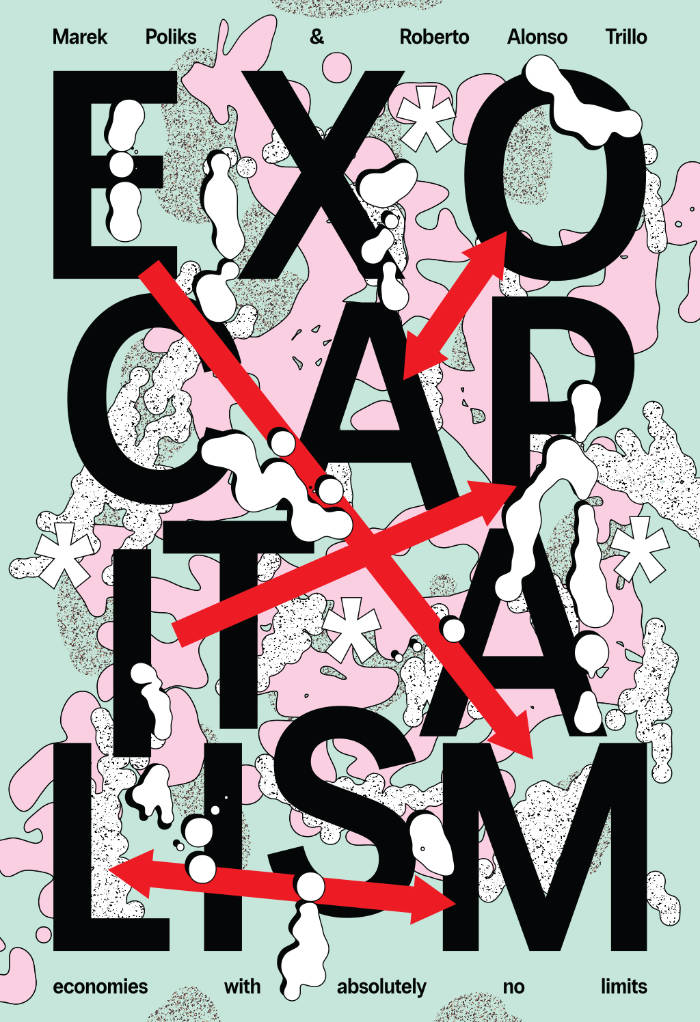
Exocapitalism – Economies with absolutely no limits
Roberto Alonso Trillo, Marek Poliks
A rigorous and mind-blowing account of the dynamics of capitalism today through an in-depth exposition of software, speculative finance, and the highest scales of arbitrage.
At the centre of Marek Poliks and Roberto Alonso Trillo's argument is the idea that capital does not belong to humans, it belongs to—and is governed by—itself. Traditional economic theory struggles to keep up with the rapid rate of acceleration, and this book steps in to address this:
"The critical orthodoxy is slowing; it's tired, it's not especially good at the internet, it's probably never manned a Starbucks counter or an anonymous cubicle. Its younger adepts—though digitally native—are chronically underemployed, unavailable, drowning in the student debt (or student opportunity cost) required for entry into the critical apparatus. Few have any patience for the numbing slop-speak of the LinkedIn economy, the libertarian enclave of forex and HFT and memecoins, the quarter-zip depravity of employment at the charnel houses of McKinsey or Deloitte or Accenture, the blazingly random mood-swings of venture capital that lubricate all of the above. This impatience is—in the parlance of the above—a blocker: it means that the critical apparatus underestimates the power of the software economy, struggles to articulate the morphological density of digitally-realized capitalism, comprehensively ignores the functional death of labor, and doesn't understand scale."
Introduction by Charles Mudede.
Afterword by Alex Quicho.
"A masterpiece... Nick Land for adults."
— 0nty
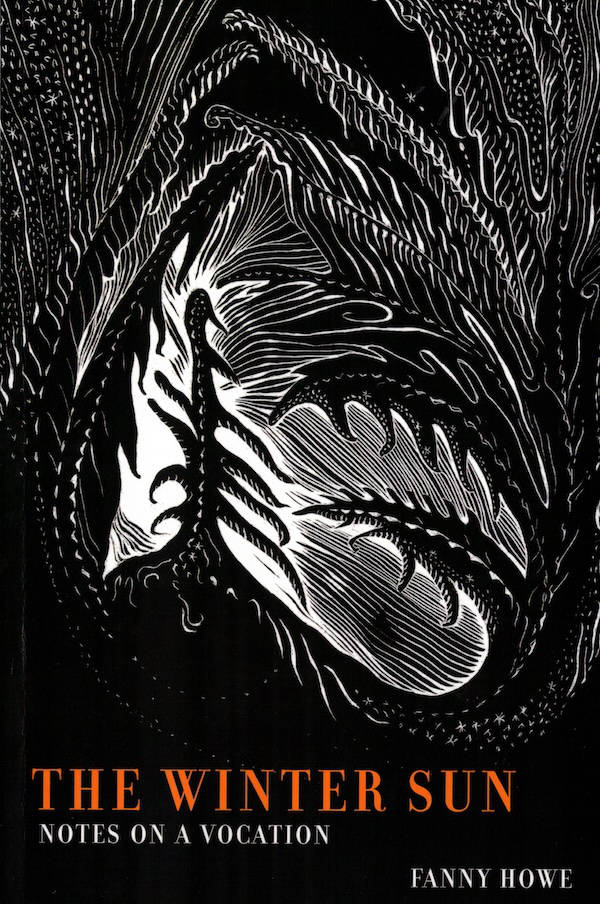
The Winter Sun
Fanny Howe's richly contemplative The Winter Sun is a collection of essays on childhood, language, and meaning by one of America's most original contemporary poets.
Through a collage of reflections on people, places, and times that have been part of her life, Howe shows the origins and requirements of "a vocation that has no name." She finds proof of this in the lives of others—Jacques Lusseyran, who, though blind, wrote about his inner vision, surviving inside a concentration camp during World War II; the Scottish nun Sara Grant and Abbé Dubois, both of whom lived extensively in India where their vocation led them; the English novelists Antonia White and Emily Brontë; and the fifth-century philosopher and poet Bharthari. With interludes referring to her own place and situation, Howe makes this book into a Progress rather than a memoir.
The Winter Sun displays the same power as found in her highly praised collection of essays, The Wedding Dress, a book described by James Carroll as an "unflinching but exhilarating look at real religion, the American desolation, a woman's life, and, always, the redemption of literature."
Fanny Howe is the author of more than twenty books of poetry and prose. She has won a fellowship from the Guggenheim Foundation and an award from the Academy of Arts and Letters.
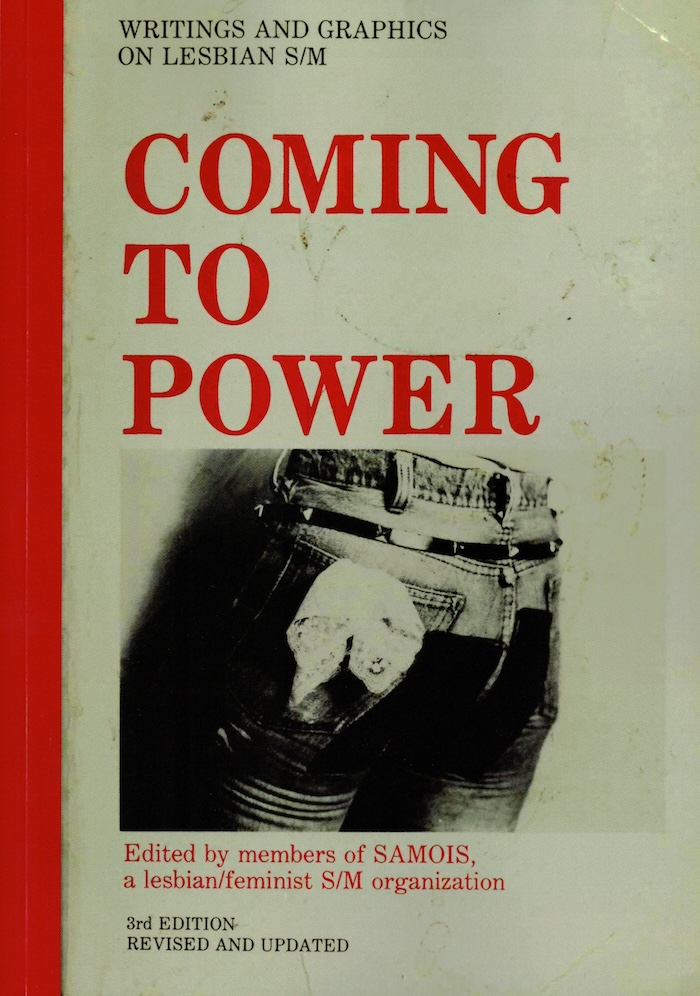
Coming To Power: writings and graphics on lesbian s/m
[reprint] a founding work of lesbian BDSM originally published in 1981.
Coming to Power is more than an attempt to put sex back into lesbian politics. It is an attempt to show, through stories, graphics and analysis, just how political lesbian sex really is. It is an attempt to remind all of us that we must continue our fight to define sexual relations in our own terms as something valid and important. And it’s the best thing that has been published on feminist theory/practice in a long, long time. So let’s go for that long-awaited walk on the wild side.
Samois was a lesbian feminist BDSM organization based in San Francisco that existed from 1978 to 1983. It was the first lesbian BDSM group in the United States.[1] It took its name from Samois-sur-Seine, the location of the fictional estate of Anne-Marie, a lesbian dominatrix character in Pauline Réage's erotic novel Story of O, who pierces and brands O. The co-founders were writer Pat Califia, who identified as a lesbian at the time, Gayle Rubin, and sixteen others.
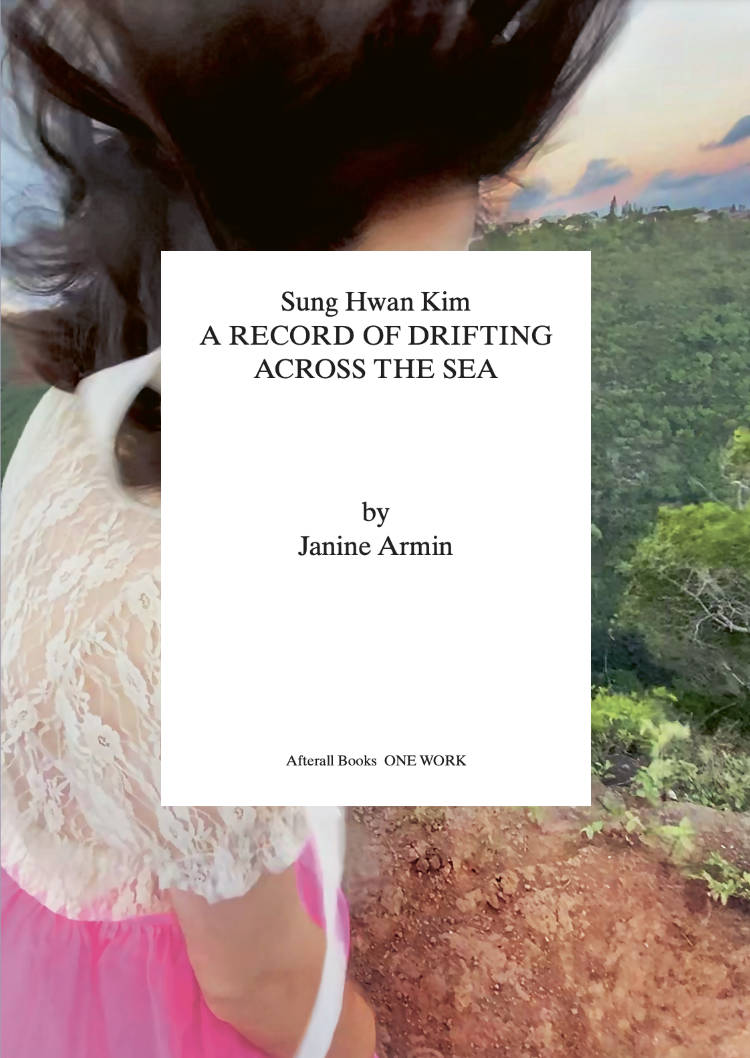
Sung Hwan Kim: A Record of Drifting Across the Sea
A richly illustrated exploration of Sung Hwan Kim’s complex record of migrant stories, displacement and belonging, border-crossings and translation.
In A Record of Drifting Across the Sea (2017–), Sung Hwan Kim looks at histories of migration. The artist parses the traces –archival and bodily – left by undocumented Korean migrants who came to the US by way of Hawai’i at the turn of the twentieth century, and ponders over their impact on other migrant and indigenous communities. As an ongoing film and installation series, comprising two chapters and a third in progress, A Record unsettles the limits of the ‘one work’ with its distributive, open-ended and collaborative nature.
In this speculative inquiry, Janine Armin explores each chapter in Kim’s multi-layered work as a mycelial network of feelers entangling and extending the wider work in-process. Engaging history through embodiment, folklore and myth, as much as through archival material, Kim navigates and crosses the boundaries between displacement and belonging. Focusing on the artist’s attempt to escape from representation, Armin illuminates and attends to the different stories and non-sovereign ways of being together towards which his work points us.
This title is part of the One Work book series, which focuses on artworks that have significantly changed the way we understand art and its history.
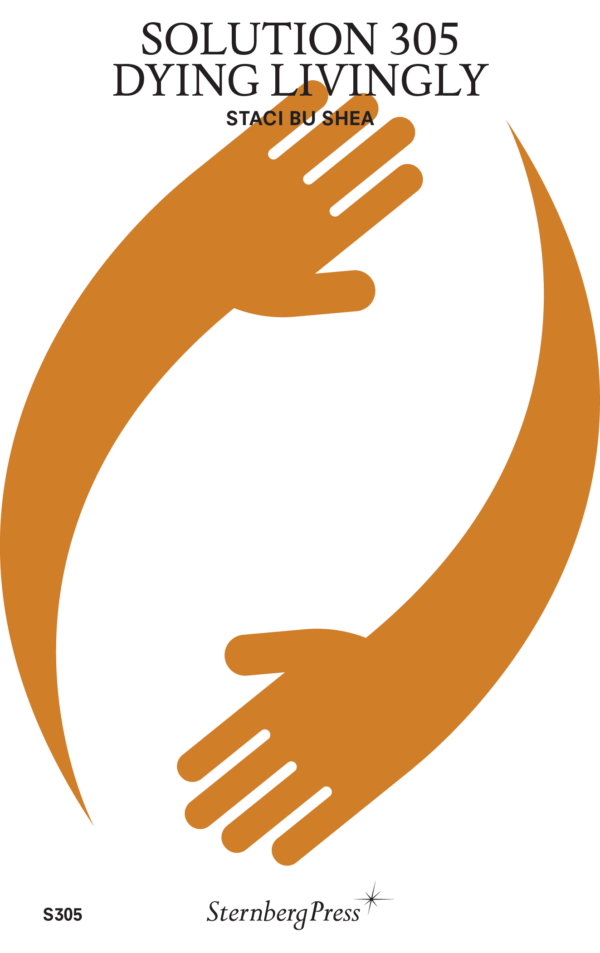
Solution 305 – Dying Livingly
A series of propositions and encounters in service to an aesthetic, critical, and poetic experience of living life led by death.
Part studious, part visceral, Dying Livingly is a collection of short essays written in the first few years of the author's holistic deathcare research and practice. With a focus on the truth of impermanence and the material cultures of death and dying, the writing reaches toward a future of compassionate, community-centered deathcare.
Death has been outsourced, medicalized, and commodified for over a century. Existing at a threshold of innovation and transformation today, death is not a plight to master or transcend but a reality of insistent change requiring our humble surrender. Working in tandem with the possibilities and limits of medicine, the holistic deathcare movement aims to support people and their communities in death literacy and phobia. It stewards both ancient and new practices in deathcare and centers social, political, and ecological imperatives for how we die.
If death is an amplification of living, the attention here is on bearing witness to life in and around the dying and the potential to contribute to a more vibrant culture of care. Living a death-oriented life is not simply for those and their loved ones navigating a terminal diagnosis and finite amount of time to live; it is for all of us. Death awareness leads to a valuing of life, which is urgently needed for justice, healing, and our livability.
With fervor and deep reverence, this collection demonstrates that what is needed above all is a presence—simple but challenging—that refuses to look away as life slips from our grip. In this light, the writing details lessons in what it means to be prepared for death but also impossibly ready. Death is a horizon that inspires us to live fully, with the vulnerability necessary in the transformative process of giving and receiving care.
Staci Bu Shea (born 1988 in Miami) is a curator, writer, and holistic death care worker based in Utrecht, the Netherlands, focusing on aesthetic and poetic practices of social reproduction and care work, as well as its manifestations in interpersonal relationships and daily life, community organizing and institutional practice.
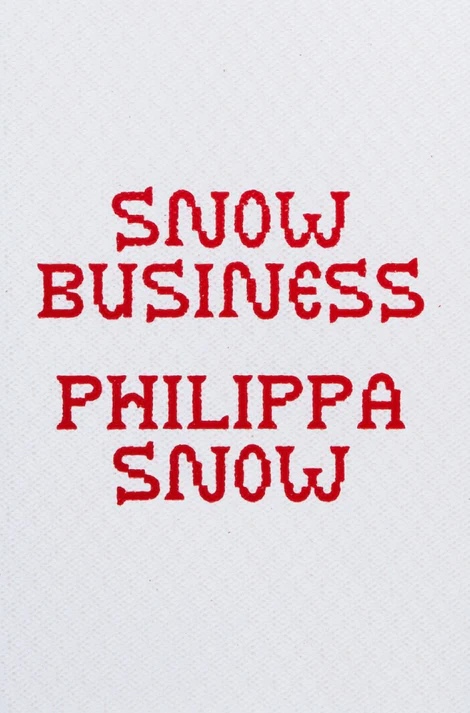
Snow Business
A collection of Philippa Snow's most celebrated writings, articulating with majestic precision the thorny, unbreakable bond between mass media, popular culture and art.
Snow Business marks Philippa Snow's emergence as one of the twenty-first century's greatest cultural critics. From the 2000s into the 2010s, reality television and "second-screen media," designed to play in the background while we look at phones, have proliferated, inaugurating the dumbient age. Celebrities have never been more ordinary; there have never been so many ordinary people who are celebrities.
A collection of her writing from the last half-decade, Snow Business articulates with majestic precision the thorny, unbreakable bond between mass media, popular culture and art. The memoirs of Pamela Anderson and the Kardashian sisters are just as worthy exemplars of "autofiction" as the writing of Olivia Laing and Annie Ernaux; Spring Breakers has succeeded in updating The Great Gatsby; and we are still afraid of Francis Bacon.
Snow has no interest in distinctions of high and low culture. If masterpieces of fiction, painting and cinema reflect back to us some vital and mysterious part of ourselves, mass-distributed popular culture does the same thing, and often with greater clarity and violence—if we are only brave enough to look. Fortunately, Snow does the looking for us.
Alongside her essays are also works of fiction, vignettes whose protagonists are actors, singers, child stars. These are strange, sometimes conspiratorial, and often nightmarish. Just as Snow Business can describe culture with stunning clarity, it can inhabit culture's moving parts, making it again something indescribable, a sensuous vision, a complete fever dream.
Philippa Snow is a writer whose work has redefined contemporary criticism through her analysis of popular culture, art, and media. Her work regularly appears in the Los Angeles Review of Books, ArtReview, The New Republic, The Nation, The White Review, and the Financial Times. She is the author of Which As You Know Means Violence (Repeater, 2022), Trophy Lives (Mack, 2024), and It's Terrible the Things I Have to Do to Be Me (Virago, 2025). Through her keen examination of reality television, celebrity culture, and high art, Snow illuminates the increasingly blurred boundaries between popular entertainment and artistic expression in the twenty-first century.
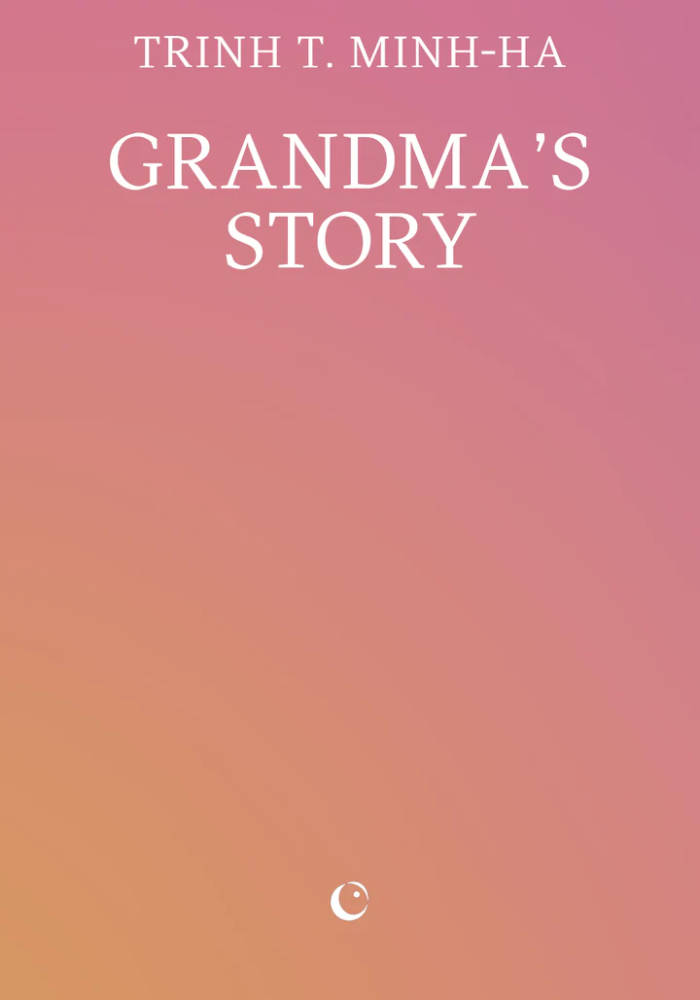
Grandma’s Story
‘May my story be beautiful and unwind like a long thread . . .’, she recites as she begins her story.
The storyteller is the living memory of her time: at once an oracle, weaver, healer, warrior, witch, protectress, teacher and great mother. Her powers are to do with passing on – not only the stories but transmission itself: ‘what grandma began, granddaughter completes and passes on to be further completed.’
In contrast to the idea that a story is ‘just a story’, pioneering postcolonial feminist theorist and filmmaker Trinh T. Minh-ha recodes ideas about truth and fantasy to tell a different story about power, civilisation, history, medicine and magic. Grandma’s Story shows how creative speech is connected to women’s powers of enchantment, drawing upon and speaking with storytellers including Theresa Hak Kyung Cha, Clarice Lispector, Maxine Hong Kingston, Leslie Marmon Silko and Zora Neale Hurston – all who may be known as ‘she who breaks open the spell’.
The story as a cure and a protection is at once musical, historical, poetical, ethical, educational, magical, and religious.
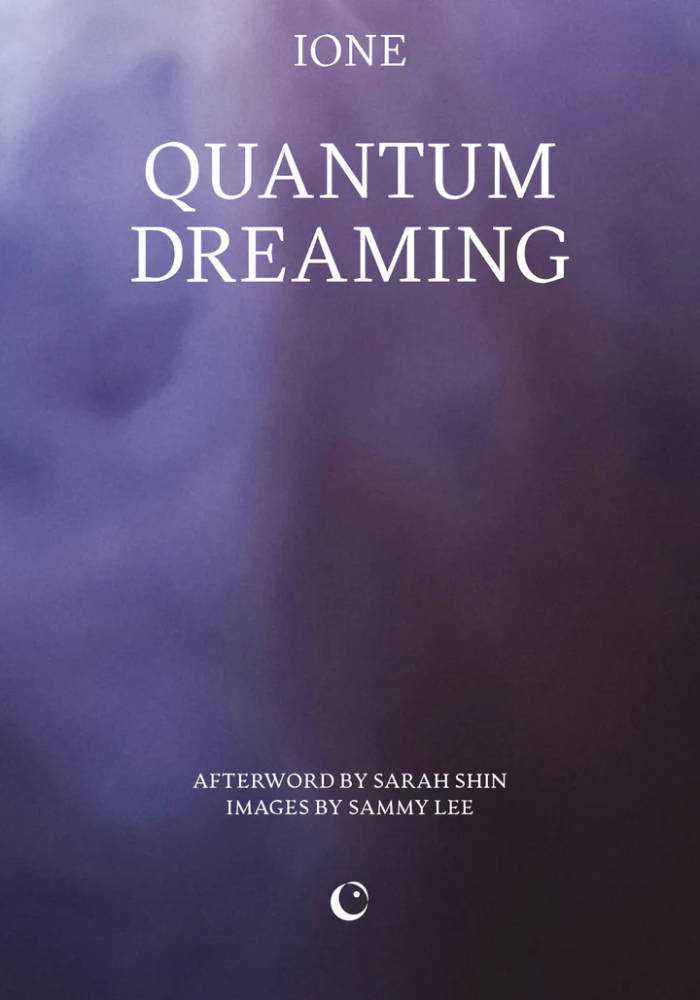
Quantum Dreaming
IONE is a Dream Keeper: a facilitator of dreams. Sharing this intimate part of our being, she believes, can be the start of new ways of being with one another.
Exploring the reality of the dream and the dream of reality over many decades has led IONE to appreciate the quantum nature of dreams. Weaving science and dream traditions from around the world together with her own memories and the dreams of her friends and community members, Quantum Dreaming shows that as we start practising awareness, our consciousness also deepens.
IONE and Pauline Oliveros’s shared vision of a harmonious, self-sustaining network of artists and dreamers led to the founding of the Deep Listening Institute. Quantum Dreaming similarly seeks a radical shift in our collective consciousness, across all states of dreaming and waking.
Afterword by Sarah Shin
Images by Sammy Lee

Par-delà étrange et familier
Dans cet ouvrage, malheureusement son dernier, Mark Fisher revisite des artefacts culturels familiers afin de cartographier les variétés de l’étrange dont ils sont porteurs. Longtemps sensible aux dimensions bizarre et omineuse qu’il devinait, sans les nommer, entre autres dans les œuvres de Lovecraft, les films de David Lynch ou les albums de The Fall, M. Fisher tente ici la synthèse essentielle d’un questionnement qui l’avait hanté, jusqu’à ce livre.
Avec son regard si particulier, celui du critique culturel tout à la fois pop et moderniste, puisant aux sources de la psychanalyse et du marxisme, Fisher se penche sur des objets sensibles pour y saisir les rapports entre présence et absence, entre ce qui devrait être mais n’est pas, ce qui ne devrait pas se présenter mais survient. C’est en compagnie de ces spectres — du titre d’un autre ouvrage — que nous sommes invités à voyager, pour questionner les formes mêmes de nos existences sociales, jusqu’aux frontières de l’étrange.